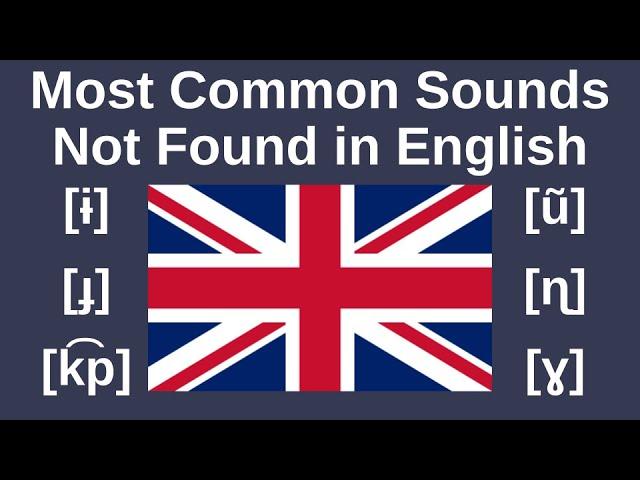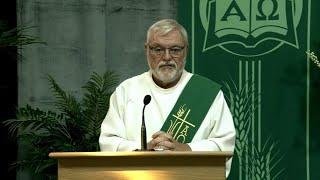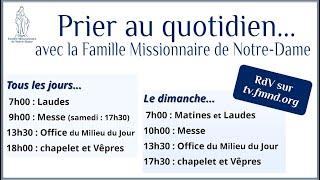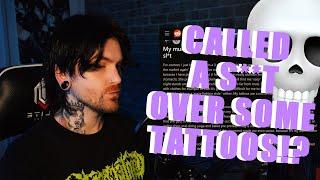Комментарии:

NOTE:
I realized that the alveolar trill /r/ does occur in some English dialects, and the Wikipedia page for "pronounciation of /r/ in English" lists 3 dialects where it occurs in, so it may very well not count.
Wikipedia also lists the "sinitic symbols" as alveo-palatal sounds, instead of pure palatal sounds. It's still a bit strange that this only occurs in Australia, and things from Wikipedia should be taken with a grain of salt.

Time to create a conlang that only uses phones not used in English...
Ответить
Isn't that sound in english already? New, Union. Don't both of them have that sound?
Ответить
I don't understand why /ny/ or ñ counts as one sound? It's /n/ /y/ and is present in English in words like canyon and bunion
Ответить
Is /ɨ/ really a stereotypically Slavic sound? It's only used in Russian and Polish. As a native Croatian speaker, it is one of the last phonemes I'd think of as stereotypically Slavic. For me, it's a one of along with Bulgarian /ɤ/.
Ответить
By the way, did you know that they forgot how many languages had a tense sieot and the Greek psi sound.
Ответить
when will there be /%/ in the IPA?
% is a manual percussive so give me requests for a manual click

I am a Native English speaker and the only sounds in this video that I can’t make are:
🌋, ʉu, ʉ, ɳ, ʈ, ɖ, ɨ
Also, for anyone wondering, the /🌋/ sound is the exact same sound as the IPA /ksqpθt/.

try usin popfilter on your mic when regularly speaking
Ответить
I have a pet peeve with recieved pronunciation. It's not the way anyone under the age of 75 talks anymore. The default English dialect these days is Standard Southern British. Also you're pronouncing pronunciation wrong.
Ответить
This would be easier to keep up with if I heard these sounds spoken in everyday life.
Ответить
Awesome video either way nyan
Ответить
I'm not sure I've actually seen it transcribed as such, But I'm pretty sure I have heard [ɲ] in English speach, as a realisation of monosyllabic /nj/, for example in the word "New" in a number of dialects.
Ответить
/x/ usually becomes /kʰ/ in Hindi
Ответить
European portuguese has that weird "i" sound, surprised it wasnt colored in the map for Portugal
Ответить
Ñ
Ответить
with the ending bit about anything being possible to say with practice, i’ve been occasionally practicing voiced and voiceless labiodental flaps, they’re surprisingly normal sounding and it’s become fairly easy to do (except as a coda, im not sure that’s possible), but my brain is still learning to either properly distinguish voicing or properly enunciate voicing lol
Ответить
I was expecting the most badass character found in arabic and urdu- ع on the top of the list😐
Ответить
I LOVE THE VOICED VELAR FRICATIVE!!!!
Ответить
As a West African I really hate how English commentators pronounce gb and kp in Pogba and Gakpo.
Ответить
Aw man, I was really hoping for 🌋🔊 to be a sound
Ответить
/e/?
Ответить
ü
Ответить
I'm confused by a linguist who spells pronunciation wrong, and I'm wondering whether i missed a memo.
Ответить
Trying to explain the sound behind the Norwegian letter "o" to someone speaking English in text seems almost impossible. They reach for the "å" so fast
I don't know any good words as example where it is used

Questioner: Are there any clicks in English?
Lingolizard: There are noun.

Pronunciation
Ответить
Wouldn't the most common labialised sound be /w/?
Ответить
The Voiced Palatal Nasal isnt natural for other native english speakers?
Ответить
now that i think about it... YEAH THAT SOUND ISNT IN ENGLISH HOW DID I NOT NOTICE-
(its the top 1 sound, not spoiling the video tho)

Never talked to a Scottish person? Also, [r] pretty regularly comes out in my speech (Australian English) when there are two flaps near each other, as in "put it on" [ˌpʰʊˈrːɔn] and sometimes before an /n/ or an /l/ as in "modern" (although it's more usually an unreleased /d/ going straight into a syllabic /n/), "I dunno" and "model".
Ответить
Might I politely suggest that you employ the term 'pronunciation' ? The term 'pronounciation' is erroneous. Thank you
Ответить
ыыыыыы
Ответить
Most of these sounds seem like they don't belong in English.
Ответить
You pronounce and write pronounciation. However, it is pronunciation, pronounced as pronunciation. Quite jarring to hear such a mistake on a linguistics channel
Ответить
In my native language Indonesian literally has "nya" as particle, that's why i could pronounce spanish sentences without even knowing spanish
Ответить










![Delphi : How to fix Error : [dcc32 Fatal Error] F2039 Could not create output file X Delphi : How to fix Error : [dcc32 Fatal Error] F2039 Could not create output file X](https://ruvideo.cc/img/upload/c2diMHhPM0ZNZms.jpg)















